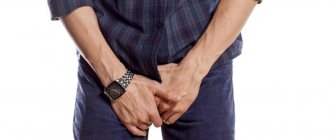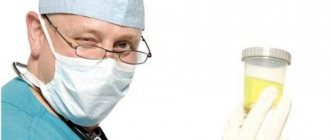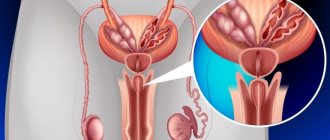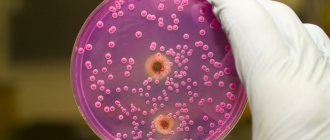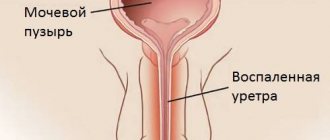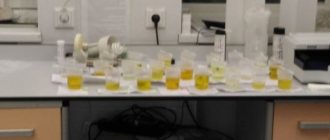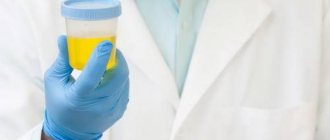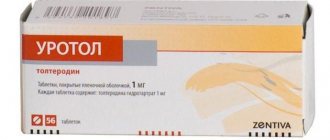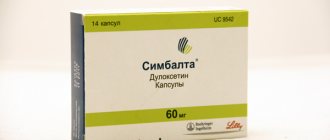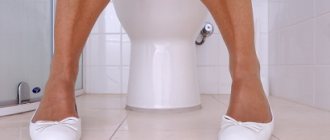If there is a pathology such as frequent urination in men, treatment and pills as an effective means of therapy are selected strictly individually. The choice of medications depends on the characteristics of the disease and the susceptibility of the patient’s body. An increased number of bladder emptyings is evidence of one of many diseases that impair the functionality of the urinary system. In most cases, this is an inflammatory process, infection or tumor development. The prescription of tablet drugs is carried out after diagnostic measures have been carried out and an accurate diagnosis has been made.
Causes of frequent urination
The entire list of reasons why the urge to urinate becomes more frequent is divided into 2 large groups: physiological and pathological.
Frequent urge to urinate indicates illness
Physiological features include the characteristics of drinking drinks and human nutrition. For example, urine output will increase from eating foods of plant origin, watermelons, melons, cucumbers, as well as from tea, alcoholic beverages (beer has a greater effect).
Pathological diseases include diseases accompanied by discharge, pain, pain and other unpleasant symptoms. The main ailments are as follows:
- adenoma (benign prostate growth);
- prostatitis (inflammation of prostate tissue);
- STIs (gonorrhea, trichomoniasis, chlamydia);
- urethritis (inflammatory process in the urethra);
- overactive bladder.
Urologists identify a number of factors that provoke frequent urination in men:
- age. After 50 the risk is increased;
- heredity. If close relatives have kidney or prostate diseases, there is a risk of encountering the same problem;
- ecology. Territories with increased radiation and large industrial cities provoke malignant formations in the organs of the urinary system;
- diet Focusing on meat products increases the risk of pathologies accompanied by frequent urination.
Why are antidepressants prescribed?
When urination becomes more frequent due to diabetes mellitus, enuresis, or unstable functioning of the bladder detrusor, urologists prescribe anticholinergics and antidepressants.
The following drugs are used:
- “Imipramine” is prescribed for urinary incontinence and painful sensations. Even a child can take the medicine. The daily dosage is determined by the doctor.
- Duloxetine is an antidepressant that relieves spasms. Indicated for use from 18 years of age.
The action of the drugs is based on relaxation of the bladder. At the same time, control of fluid discharge is maintained.
Diagnosis of the disease
First of all, the doctor examines the patient, clarifies the timing of the onset of unpleasant symptoms, possible provoking factors - nutrition, illness, sex life. Diagnostic measures include studies:
- laboratory blood tests (general and biochemistry) will indicate inflammation, anemia, dehydration, kidney disease - if any. A urine test will reveal protein, mucus, blood and other pathological inclusions that may accompany the disease characteristic of this symptom;
- Ultrasound of the kidneys, prostate, pelvic organs;
- bacterial culture from the urethra;
- CT scan of the kidneys (most often prescribed for stones).
A mandatory item is differential diagnosis, with the help of which it is possible to distinguish diseases of the prostate, urinary tract, kidneys, and sexually transmitted diseases.
Drug treatment
Therapy is prescribed taking into account the cause of frequent urination. If no cause is identified, the following types of recommendations are given:
- adjust diet and drinking balance;
- give up alcoholic drinks;
- stop taking certain medications if possible.
As for medications, the following are prescribed in a comprehensive manner:
- drugs that change the pH of urine (cleanse the ducts of sand and salts);
- antiseptics (kill germs in the urinary system);
- antibiotics (for infections, STDs);
- antiprotozoal agents (against ureaplasma, chlamydia);
- antiviral (for herpes, papillomas);
- α-adrenergic receptor blockers (for adenoma, prostatitis).
With an overactive bladder, urge occurs when even a small amount of urine accumulates.
If medications do not give the desired result, surgical intervention is sometimes required. Treatment and diagnostic laparoscopy, sclerosant injections, and sling operations are prescribed.
Antibiotics are prescribed only when an infection is detected. The doctor will prescribe either broad-spectrum drugs or narrowly targeted ones if a specific pathogen is identified. Cephalosporins, fluoroquinolones, and penicillins are usually prescribed. The course lasts differently depending on the stage, form of the disease, the presence of complications, and age. When the acute period subsides, nitrofurans (antimicrobial drugs) are prescribed. In addition to antibiotics, antispasmodics and drugs to relieve pain and urine flow must be prescribed. The most famous drug is Canephron.
It is important to take vitamin supplements because they have a complex effect:
- stop the inflammatory process;
- regulate kidney function, improve function;
- remove toxins;
- normalize blood circulation;
- strengthen defenses.
The most significant benefits are provided by: carotene, vitamins C, B, pectins, omega-3. You can adjust your diet so that you get these substances in your diet, or buy them at the pharmacy.
Associated signs of pathology
An accurate diagnosis is revealed only after a full examination. However, there are symptoms that may indicate the development of a certain pathology.
In addition to frequent urination, various diseases are accompanied by the following symptoms:
- Diabetes mellitus is characterized by itchy skin, a feeling of constant fatigue, increased sweating at night, and sticky sweat.
- Acute pyelonephritis begins with a sharp rise in temperature to 39, aching pain in the lower back, chills, and nausea. Urinary disorders usually develop with a chronic form of the disease.
- Glomerulonephritis contributes to increased blood pressure and the appearance of swelling. The volume of urine excreted sharply decreases, impurities and hematuria are observed in it.
- Urolithiasis is characterized by periodic pain. They occur when stones pass through the canals. Large inclusions can significantly injure the walls, causing blood to appear in the urine. General symptoms of intoxication may be present: weakness, tachycardia, nausea with vomiting.
- With cystitis, flakes of pus are found in the urine and it becomes cloudy. The pain is localized in the lower abdomen and radiates to the perineum, sometimes there is a slight rise in temperature. Cystitis is a common consequence of hypothermia.
- The presence of an adenoma affects the process of urine excretion. The flow of fluid may be sluggish or intermittent, false urges and incontinence appear. You often have to make an effort to urinate.
- Venereal diseases are characterized by the presence of purulent discharge from the urethra.
- Prostatitis causes reproductive dysfunction, a feeling of incomplete emptying of the bladder after urination, and discomfort during bowel movements.
If there are no additional symptoms, overactive bladder syndrome may be suspected. Pathology occurs as a result of head trauma, brain tumors, or appears during the aging process of the body.
Frequent urination, which is accompanied by diarrhea, requires a comprehensive examination. The reasons can be very different: helminthic infestation, chronic intoxication, heart or endocrine diseases.
Treatment for prostate adenoma
An adenoma is a benign growth of the prostate gland. The process takes place in stages. The initial stage lasts 1-10 years, characterized by problems with urination - frequent urge, intermittent or weak stream, a feeling that something is left in the bladder after emptying. As soon as the signs begin to bother you, you need to be treated immediately, otherwise the disease progresses to such a stage that surgical intervention is necessary. Adenoma is fraught with infertility and problems with potency.
At first, the doctor and patient decide together whether to treat or remove the gland. The operation will permanently relieve problems, but is associated with risks of complications. Drug treatment sometimes lasts for life; medications cause side effects. Drug therapy involves the use of a complex of drugs:
- antispasmodics;
- testosterone-lowering agents.
The proliferation of prostate tissue increases the tone of its smooth muscles, causing dysuric syndrome. Alpha-blockers Doxazosin, Silodosin, Tamsulosin are prescribed. After 2-3 weeks, the condition improves, but if you stop taking the medication, the effect disappears. Adverse reactions – dizziness, headache, hypotension. Such medications are taken for a long time, often for a lifetime.
Diagnosis and treatment of frequent urination
There are various medications for frequent urination in men. Therefore, before purchasing the drug, you must consult a doctor. First of all, you should find out the cause of this symptom. To do this you need to undergo an examination. To diagnose inflammatory pathologies of the genitourinary system and diabetes mellitus, it is necessary to perform a CBC, OAM, and a blood sugar test.
In most cases, digital examination of the rectum is required. This is necessary to assess the condition of the prostate gland (its shape, size, consistency). Only after the diagnosis has been established are pills prescribed for frequent urination in men. These include medications “Oxybutynin”, “Driptan”, “Duloxetine”, etc.
For initial treatment of difficulty urinating, broad-spectrum antibacterial drugs and a complex of urological medications are most often used. In addition to drug therapy, the patient is recommended to undergo a course of physical procedures: laser and magnetic therapy, short-pulse electroanalgesia (exposure to short current pulses), electrophoresis, etc.
For initial treatment of difficulty urinating, broad-spectrum antibacterial drugs and a complex of urological medications are most often used.
In case of severe disturbance of urination processes, a specialist will install a catheter. With advanced prostate adenoma, conservative therapy cannot always help, then surgical intervention will be required.
Drugs
Antibiotic therapy for urinary disorders is necessary, and a specialist selects tablets from this group individually:
- broad-spectrum antibiotics - effective for infections of the genitourinary system (Nolitsin, tetracycline drugs, cephalosporins, etc.);
- medications that act on intracellular microorganisms are used in the treatment of STDs (sexually transmitted infections) - Erythromycin, Azithromycin;
- uroantiseptics - Monural, Palin, Nolitsin.
In acute cases, the duration of therapy is 3-4 weeks; in chronic cases, longer treatment is required.
When infected with Trichomonas, Trichopolum remains an effective medicine, while for Candida - drugs with antifungal action - Fluconazole, Nystatin. Adrenergic blockers – Doxazosin, Terazosin (Cornam), Alfuzosin.
When infected with Trichomonas, Trichopolum remains an effective medicine.
For inflammation of the bladder and prostate gland, men are recommended to take alpha blockers - drugs that relax the muscle tissue of the organs. They help normalize urination processes. To eliminate pain when urinating, the following are prescribed:
- antispasmodics: Drotaverine, Spazgan, No-shpa, Nosh-bra, Spasmol;
- non-steroidal anti-inflammatory drugs: Ibuprofen (analogues: Brufen, Ibufen, Nurofen, Ibuklin), Paracetamol (analogs: Efferalgan, Panadol, Perfalgan).
Drugs that have an anticholinergic effect - Pro-bantin, Pro-antin, Oxybutin - effectively eliminate spasms of the urethra.
To maintain immunity, the patient is prescribed immunomodulating and immunostimulating agents, most often of plant origin: tincture of ginseng, echinacea, Immunal.
Folk remedies
Traditional medicine offers different ways to normalize the act of urination. Regular warm baths help alleviate the condition; it is recommended to sit for at least a quarter of an hour. For the procedure, it is recommended to use herbal decoctions - chamomile, celandine, St. John's wort, dandelion root.
You can treat inflammation of the genitourinary system and restore urination at home using the following means:
- Pumpkin seeds - at the first signs of pathology, it is recommended to eat 1-1.5 cups of peeled seeds within 24 hours. They contain components necessary for men's health and help get rid of prostatitis and erectile dysfunction.
- Flaxseed - an infusion of this plant component stops the process of prostate tissue proliferation, normalizes hormonal levels, and accelerates tissue repair processes. You need to steam 1 tsp. seeds in 1 glass of water and boil the mixture. It becomes thick, so it is diluted with water before use.
- Aspen buds - infusion helps eliminate inflammatory processes. To prepare it, you need to take buds and water in a ratio of 1:10, pour in the raw materials and leave to infuse for 1.5 weeks.
At the first signs of pathology, it is recommended to eat 1-1.5 cups of peeled seed during the day. They contain components necessary for men's health and help get rid of prostatitis and erectile dysfunction.
An infusion of flaxseed stops the process of prostate tissue proliferation, normalizes hormonal levels, and accelerates tissue repair processes.
An infusion of aspen buds helps eliminate inflammatory processes. To prepare it, you need to take buds and water in a ratio of 1:10, pour in the raw materials and leave to infuse for 1.5 weeks.
Frequent urination requires examination of the body from all sides, because many reasons provoke such a symptom. The first examination is carried out by a urologist, then the doctor writes out a referral to visit the necessary specialists: a therapist, an endocrinologist, a cardiologist, a neurologist and other specialized specialists, depending on the patient’s complaints about the course of the symptom.
A treatment method is prescribed, depending on the “provocateur” of the problem.
The following methods are used:
- Drug treatment. For inflammatory and infectious diseases, antibiotics are used. To normalize the functioning of the bladder sphincter, agents are used that restore tone and full function. To eliminate frequent urination in diabetes mellitus, medications are prescribed that lower blood sugar levels so as not to provoke the desire to drink a lot of liquid and protect the condition of the nerve endings. Taking medications to improve the condition of the prostate is effective in non-malignant stages of the disease of the genital organ;
- Physical activities. Men are invited to master several exercises to increase the tone of the pelvic muscles and control contractions of the pubococcygeus muscle. It is this muscle that works when releasing urine from the bladder;
- Surgical treatment. Prostate cancer or adenoma sometimes does not respond to other treatment methods. Using a conservative method, it is possible to reduce the incidence of frequent urination and normalize the functions of the genitourinary system. If there is deformation or atrophy of the external part of the bladder, it is possible to surgically treat the element and normalize the natural process of urine outflow.
A doctor can determine the exact cause of the disease.
The attending physician will be able to make an accurate diagnosis and determine the cause of the “disaster” after certain studies of the health condition.
You will need to take the time and go through:
- laboratory tests of urine and blood;
- prostate secretion studies;
- rectal analysis of the prostate gland;
- biochemical analysis of urine and blood for the presence of inflammatory processes;
- Ultrasound of the genitourinary system;
- computed tomography of the kidneys;
- MRI of the head (if necessary).
We recommend you look at these drugs
Cialis Soft from 1300 rub.
Viagra Soft from 1250 rub.
Boss Royal Viagra from 1170 rub.
Urinary retention in men
Based on the test results, treatment is prescribed. The medications should be prescribed by a specialist, depending on the underlying cause of frequent urination.
Tablets can be used in several groups at once:
- antibiotics;
- natural remedies or dietary supplements;
- homeopathic medicines;
- antidepressants;
- immunomodulators;
- uroseptics;
- hypoglycemic medications.
The most effective and frequently used tablets against frequent urination are:
- Imipramine. The drug is prescribed to men with psychological disorders, and also as an antidepressant component in complex therapy to relax muscles and reduce the psychological causes of discomfort;
- Spasmex. Recommended for neurological reasons causing frequent urination. While taking the drug, there is a positive trend in the patient’s well-being;
- Duloxetine. The tablets relieve pain and reduce the frequency of urination;
- Afala. A remedy for restoring stable prostate function. Can be used to prevent prostatitis and prostate adenoma. In case of impaired urination, it can be used with other drugs;
- Erythromycin. Broad-spectrum antibiotic. Used to destroy inflammatory and infectious phenomena in the body.
It is recommended to combine treatment with the use of beneficial herbs
Traditional medicine recipes can be combined with basic treatment, and can also be used in the initial stages of pathologies in the genitourinary system. Useful components from plants, berries and herbs are rich in vitamins and substances to normalize functions, relax muscle tissue, eliminate pain, and prevent changes in the structures of organ tissue.
The following products help combat unhealthy urination:
- green tea;
- rosehip decoction;
- infusion of St. John's wort;
- sesame seeds;
- fried lentils;
- Dill water;
- lingonberry berries.
Treatment of frequent urination with folk remedies
In folk medicine there are a lot of remedies that help reduce the urge to urinate and eliminate incontinence. It is not possible to be cured with plants alone, but it is quite possible to help the body increase immunity and reduce the side effects of medications. To do this, use the following means:
Cranberries contain many vitamins and microelements
- lingonberry leaves. Relieves inflammation and destroys bacteria. Helps against cystitis, nephropathy, pyelonephritis;
- cranberry. It contains tannins, which cleanse the urinary cavity from bacteria;
- wormwood, bearberry. These are natural uroseptics that are used in decoctions and infusions;
- echinacea, eleutherococcus, aloe. Extracts of such products are offered by pharmacy chains. They strengthen the body and improve the functioning of various systems, including the urinary system. A doctor will help you choose the right plants.
To strengthen the muscle frame, doctors recommend performing special gymnastics. These are Kegel exercises aimed at working the muscles of the perineum. They will relieve the pelvic organs from stagnation, improve blood circulation, relieve inflammation, and help overcome incontinence. It is enough to repeat the complex of compression/relaxation of the perineal muscles several times a day to soon feel improvements.
Physiotherapeutic treatment
Physiotherapeutic procedures are often recommended for acute and chronic diseases of the urinary system. Thanks to this effect, spasms are weakened, the inflammatory process stops, and urine is excreted on time and correctly. Not everyone is eligible for physical therapy. The contraindications are as follows:
- acute pyelonephritis;
- terminal stage of chronic pyelonephritis;
- polycystic disease;
- decompensated hydronephrosis;
- malignant neoplasms.
The gradual growth of an adenoma is a violation of urination
The following physiotherapeutic procedures will be useful for frequent urination in men:
- balneotherapy;
- UHF;
- magnetic therapy;
- hydrotherapy;
- Microwave;
- amplipulse;
- ultrasound, laser therapy;
- electrophoresis with a suitable antibacterial drug.
Urologists prescribe a sanitary-resort course of therapy using mineral waters to most of their patients.
Vitamin therapy
Taking vitamins is an integral part of complex therapy for diseases of the genitourinary system in men. Retinol, carotene, riboflavin, folic and pantothenic acids, niacin, thiamine, and ascorbic acid are especially useful.
They have the following effect on the body:
- improve blood flow;
- help restore renal function;
- stop the inflammatory process;
- strengthen defenses;
- accelerate the elimination of toxins.
By taking vitamins, patients notice an improvement in their well-being within a short time. Pharmacy complexes are used as prescribed by a doctor.
You should also enrich your menu with products that contain these substances.
Prevention
When frequent urination is caused by food or drinks, you just need to adjust their quantity, quality, and the condition will improve. If frequent urination is associated with pathology, we can talk about preventive measures aimed at preventing further deterioration of the condition:
- during casual sexual intercourse, be sure to use condoms - this will protect against urogenital infections and STDs;
- adjust the diet so that it is as close as possible to the norms of a healthy diet - this will prevent the formation of kidney stones;
- quit smoking, stop drinking excessive alcohol;
- undergo regular preventive examinations (ultrasound, tests).
The prognosis depends on the cause of the problems with urine excretion. Modern medicine allows us to count on the success of treatment even in very severe cases, but there is no guarantee that the problem will be eliminated forever. Therefore, prevention comes to the fore for everyone who is at risk.
Mechanism of drug action
The main treatment for frequent urination in men is antidepressants. The action of these tablets is aimed at relaxing the bladder, but also at the same time controlling involuntary urinary diversion.
The following medications will help:
If you take M-anticholinergics, they have a relaxing effect on the smooth muscles of organs, including the bladder. As a result, the capacity of the bladder increases, which reduces the frequency of trips to the toilet.
The following tablets for frequent urination are usually prescribed:
If the pathology is caused by atrophic changes in the bladder, then the symptoms of the disease can be relieved with the help of hormonal medications, for example, Desmopresin. Increased urine output due to urinary stones should be treated with drugs that regulate urine acidity. They help the body naturally remove stones and salts from the urinary tract and bladder. Such medicines include:
A nasal medicine for frequent urination in men (especially at night) is the hormonal drug Desmopressin. This is a spray for injection into the nasal passages. The effect of the drug is due to a decrease in urine production by the kidneys. Even children are allowed to use this medication.
If frequent emptying of the bladder is caused by various infectious pathologies of the urinary tract, then in this case the main pills for frequent urination in men are antibiotics and antimicrobial agents.
List of drugs
If frequent urination is observed in men, what to treat is stated in the medical protocol. As a rule, according to the instructions, drugs from the following list are prescribed:
- Oxybutynin is commonly used to treat enuresis caused by detrusor dysfunction and problems with nerve regulation. The medicine is contraindicated in gastrointestinal atony, during lactation and pregnancy. Its analogues are Driptan and Novitropan. The dosage is determined individually depending on the age of the patient.
- The drug Spazmex has an M-chlinolytic effect. It is prescribed for various forms of frequent urination and enuresis. The drug causes adverse reactions, so it is used with caution in elderly patients.
- Duloxen is a sedative. It is considered an antidepressant and antispasmodic. The drug not only reduces the frequency of trips to the toilet, but also relieves the pain that accompanies the process of emptying the bladder. This medicine is not prescribed for people under 18 years of age. Duloxen is used to treat patients with diabetes, nervous pathologies and depression.
- Imipramine is an antidepressant and is prescribed for incontinence and pain. Dosage depends on age. The product is suitable for treating children.
Important! To increase the effectiveness of drug therapy, physiotherapeutic methods of getting rid of frequent urination and special exercises are used along with it.
Folk remedies
Do you want to know how to treat frequent urination in men using alternative medicine? At home, medicinal herbs, wraps and baths are used. To cure enuresis and frequent urges, you should pay attention to the following remedies:
- It is useful to do sitz baths with the addition of horsetail infusion. It is prepared as follows: 30 g of chopped herbs are poured with boiling water (0.6 l), left for an hour. The filtered infusion is poured into a bath of warm water. They take a bath for a third of an hour, after which they put on warm underwear.
- It is easy to cure incontinence and frequent urges caused by infectious and inflammatory pathologies using a composition with an astringent, antiseptic, soothing and anti-inflammatory effect. To prepare it, mix equal amounts of thyme, chamomile and sage. Wash the genitals with warm broth twice a day.
- Mix equal amounts of centaury and St. John's wort. 15 g of the mixture is poured with boiling water (approximately 0.45 l) and left for 20 minutes. You should drink the medicine instead of tea throughout the day.
- Prepare an infusion of carrot tops and parsley. Finely chopped raw materials are poured with boiling water (0.5 liters per bunch). Keep in a thermos for 2 hours, take 15 ml ½ hour before meals.
- Corn silk is brewed in a ceramic teapot, like tea leaves. After two hours of infusion, take a glass at a time.
- Young cherry twigs are brewed in the same way. Honey is added to the resulting medicine for taste.
- 45 grams of shepherd's purse herb are poured with boiling water (no more than 0.6 l) and kept in a thermos for three hours. Take 25 ml before meals three times throughout the day.
- Stinging nettle is a good diuretic and anti-inflammatory agent. The rhizomes and leaves of the plant are brewed and drunk instead of tea.
- In case of frequent urinary diversion, it is useful to drink lingonberry and cranberry juice, as well as rosehip decoction.
- Linden blossom helps a lot. 5 grams of flowers are poured with boiling water (about 0.5 l) and left for half an hour. Drink 100 ml three times before meals in small sips.
- In 250 milliliters of boiling water, infuse 20 g of dill seeds, filter and drink at a time.
Worth knowing! Compresses and wraps made from fresh onions are very helpful for incontinence. The crushed pulp, placed on a gauze napkin, is applied to the lower abdomen and wrapped in a scarf.
